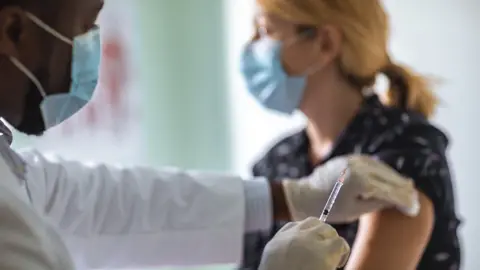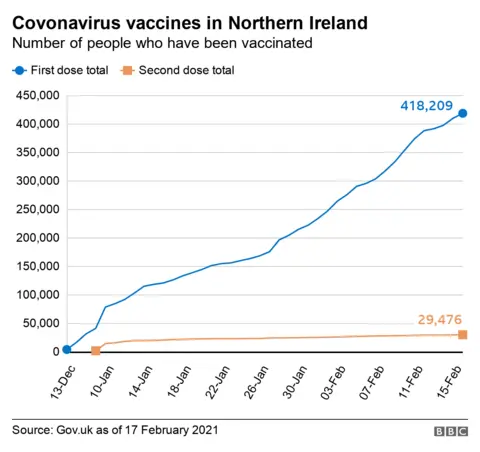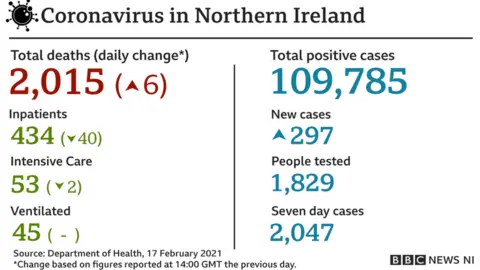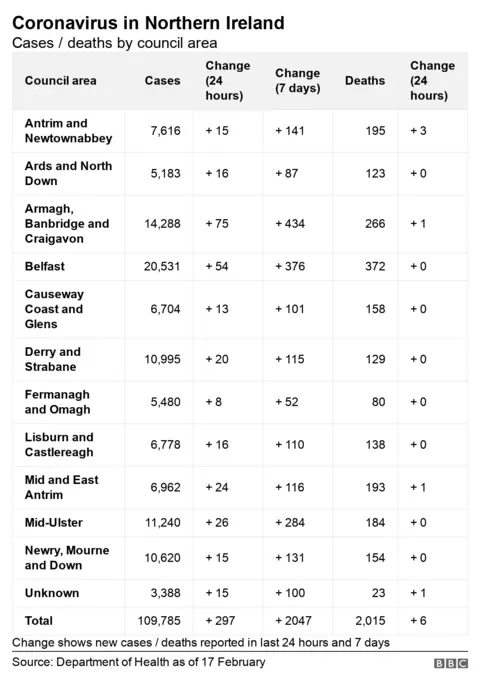Covid-19: NI vaccination programme extended to carers
 Getty Images
Getty ImagesNorthern Ireland's Covid-19 vaccination programme has been extended to include carers and more people with underlying health conditions.
The vaccine rollout will be divided between GP practices and the seven regional vaccination centres.
Northern Ireland's vaccine rollout is running weeks ahead of schedule, Health Minister Robin Swann has said.
On Wednesday, the Department of Health recorded six more Covid-19 related deaths, taking its death toll to 2,015.
People aged 18 to 64 with underlying health conditions - as well as their carers - will now be contacted by GPs for their jab.
This extended target group largely mirrors those who receive the winter flu vaccine each year because of their medical conditions.
Carers aged 60-64, anyone aged 65-69 and those who received a shielding letter because they are Clinically Extremely Vulnerable (CEV) will now be able to receive the vaccine at a regional vaccination centre.
In addition, anyone over 70 who has not yet had their first dose from their GP will have the option to book a vaccination appointment at one of the seven regional centres.
The timing of vaccination jabs for people with asthma depends on the severity of their condition, and is based on an assessment from their GP, said the health department.
Good progress - so far
Health Minister Robin Swann encouraged anyone eligible for vaccinations to book as soon as possible.
"It had been planned to begin vaccinating carers in early March," he said.
"I am delighted that we are now able to bring this forward, on a staggered basis.
"As ever, the rate of our progress through the eligible groups will depend on available supplies of vaccines," added Mr Swann.
There are currently 434 Covid inpatients in Northern Ireland's hospitals, with 53 being treated in intensive care, 44 of whom are on ventilators.
The Department of Health said there were currently 53 active outbreaks in care homes.




In Wednesday's figures, the largest increase in cases came in the Armagh, Banbridge and Craigavon area, where 75 extra cases of Covid-19 were reported in the last 24 hours.
The council area has also seen the biggest increase in new cases of the virus reported over the last seven days.
The Republic of Ireland reported 650 new cases on Wednesday, and 57 Covid-19 related deaths, bringing the country's death toll to 4,036.


So far, more than 2,800 people in Northern Ireland who are clinically housebound have received their first Covid-19 jab.
Clinically housebound patients have been receiving the Oxford-AstraZeneca vaccine. The department began vaccinating that cohort of patients on 6 February.
While just under 16,000 people are registered to receive the flu vaccine at home according to the Department of Health, a number of housebound people have been receiving their Covid jab at their GP practice as well.
Allow X content?

The Northern Ireland Executive is due to meet on Thursday to review the ongoing coronavirus restrictions.
It has been seven weeks since Northern Ireland re-entered lockdown and officials have urged caution over the easing of any restrictions.
A lockdown began in Northern Ireland on 26 December, with schools closed along with non-essential shops.
It falls to the five parties that make up Stormont's power-sharing executive to decide whether to extend restrictions beyond 5 March, or begin the process of lifting them.
